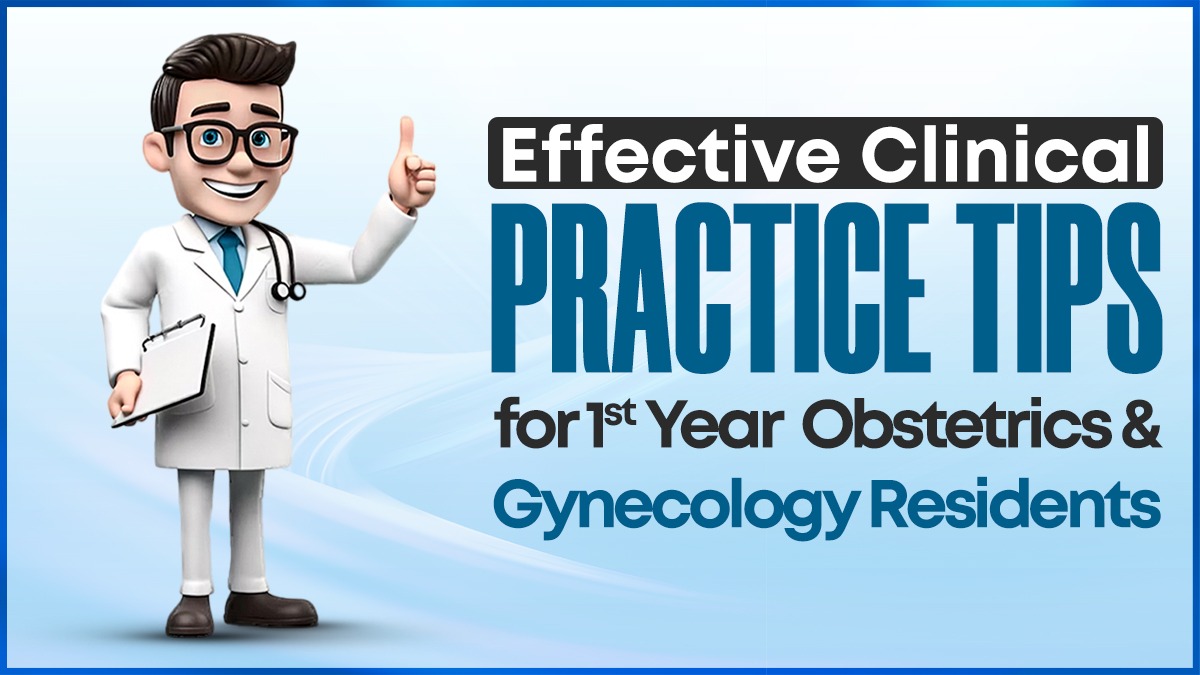Estimated reading time: 4 minutes
Obstetrics Gynecology Residency is an important phase that lays the foundation for your future clinical experience. In this period success depends on how one is at developing effective approaches, obtaining good habits, and avoiding common pitfalls. In the succeeding discussion, we share effective strategies for clinical practice, especially for first-year residents, and provide insight into what habits to nurture and avoid.
1. Tips for 1st Year Residents in Obstetrics and Gynecology
The first year of residency is an exciting yet overwhelming period as one adjusts to life from being a medical student to being a medical professional. Here is how to make the most out of your obstetrics and gynecology residency:
Laying the Groundwork: Build a really strong foundation by mastery of clinical examinations, obstetric procedures, and gynecologic surgeries forming the basis of most OBS-GYN residency programs. Safe and effective care must be cognizant of both normal and abnormal physiology, pathology, and pharmacology.
Good Time Management: Patient care, academics, and personal life are three tasks that are quite difficult to handle simultaneously. Prioritise the task, make checklists, and manage your time correctly. Proper time management will help in avoiding burnout by maintaining consistency in clinical practice and OBS-GYN Residency Exam preparation.
Engage in Active Learning: Clinical practice during the residency period in obstetrics and gynecology is a steep learning curve. Take advantage of teaching rounds, attend lectures, participate in case discussions. Engaging with mentors and seniors would help considerably in enhancing learning.
Hands-on Experience: Always volunteer to help in surgeries and procedures. Be it prenatal care, deliveries, or gynecological operations, hands-on experience will whet your practical skills and make you confident.
Communication is Key: Build clear communication with your patients and colleagues. Creating good communication habits, including active listening and concise explanations, will render you an effective clinician.
Continuous Self-Assessment: Regularly reflect on your clinical performance. Seek feedback from mentors and colleagues on areas where you need to improve.
2. What not to do in Residency?
While striving to learn and acquire newer skills, it is similarly relevant to avoid some kind of behaviours that may interfere with the process of becoming a good OBS-GYN Resident:
Avoid Shortcuts in History or Physical Examination: Many diagnoses have been missed and some signs are ignored just because of an effort to take a shortcut. When conducting any form of examination, do not rush it, and write down your findings correctly.
Do not stop taking good care of yourself: The workload is exhausting during the residency in obstetrics and gynaecology lack of concern for well-being will eventually lead to burnout. One should eat well, rest well, sleep sufficiently, exercise regularly, and take time off when needed. Maintenance of mental and physical health is going to be one of the keys to your clinical performance.
Don’t be complimented: Your understanding is never complete. Obstetrics and gynecology is dynamic brach. Get to know the latest research, approaches, and guidelines. Self-satisfaction regarding learning will result in practicing obsolescence and therefore will affect your patient care.
Don’t Be Afraid to Ask: You cannot know everything in your first-year residency. If you are really in doubt over some clinical decision, always go and seek advice either from a senior resident or from a faculty member. It is always better to ask than to make a mistake.
How can Conceptual OBG benefit you?
Conceptual OBG is an invaluable resource while working one’s way through the arduous path that is an Obstetrics and Gynecology residency. Expert-led lectures on this website, comprehensive study materials, and a real emphasis on clinical skills mean preparation that will show in both academic exams and real patient care. Case discussions, mock exams, and further learning have built a supportive environment that helps the whetting of knowledge and instils confidence in practice for the OBS-GYN Residents. Up to this end, Conceptual OBG remains the best resource for mastering the course of OBS-GYN Residency and excelling in the career by filling the gaps between theory and clinical applications.
Conclusion
Success in residency depends on good habits, clinical practice, and avoidance of common pitfalls. Through active learning, communication, and organisation, the resident can be assured that professional growth and delivery of excellent patient care are accomplished. Indeed, with the right strategies in place. If you are struggling between your practice and preparation join Conceptual OBG. The conceptual OBS-GYN platform will be your journey partner that transforms you into a skilled, compassionate, and competent specialist.


